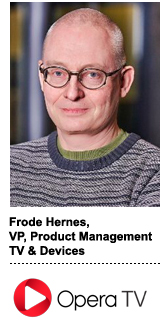 These are the TV brands you know – Sony, Samsung, LG. But the browser inside their hardware comes courtesy of a third party.
These are the TV brands you know – Sony, Samsung, LG. But the browser inside their hardware comes courtesy of a third party.
And Opera TV, the purveyor of said software, is starting to dip its toe into more consumer-facing fare.
“We shipped 42 million devices with our software last year and we’re nearly at the volume we need to be if we want to be attractive to advertisers,” said Frode Hernes, Opera TV’s VP of product management for TV and devices. “We just need a little more scale. We’re still building up.”
Historically, the business has centered on B2B licensing. OEMs and connected TV manufacturers bake Opera TV’s browser inside their operating system, with their own user interface on top.
While that’s still Opera TV’s bread and butter, it became clear that being a component of another company’s product, no matter how specialized or vital a component it is, was not the safest bet.
“If that component gets commoditized, that could be very bad,” Hernes said. “We needed to hedge and have a deeper, broader offering. We also wanted to interact with end users in real time.”
About five years ago, Opera TV rolled out an app store for smart TVs, primarily for short-form video, monetized through Opera TV’s sister entity Opera Mediaworks.
AdExchanger caught up with Hernes to talk OTT challenges, OTT opportunities and what’s up with the FCC’s efforts to unlock the set-top box.
AdExchanger: Who are your competitors?
FRODE HERNES: We try to avoid competing directly with Apple TV, Roku and Android TV, but we do sometimes brush up against them. For example, Sony selected to use us in Europe rather than Android because we’re more experienced at bringing content to TV than the Android development team, which is more focused on mobile.
At the software level, there are a couple of companies, like Firefox OS, with traditional browser engines that deliver to TV, and there are a number of fairly small competitors making app stores for TV, mainly in the Chinese market. But our main competition on the software side actually comes from the manufacturers and providers themselves, like Samsung, Comcast or LG. They have huge engineering staffs, probably bigger than our entire company.
How do you approach data collection and personalization?
We haven’t taken full advantage of that potential yet. We have a recommendation engine that looks at what you’ve been watching and what’s popular with your peers in the same demographic. If you watch a lot of snowboarding videos, then we should probably serve you more snowboarding videos.
Are you holding back because of privacy issues like the ones associated with Vizio?
Privacy is important, of course – I believe other actors in the market have gone too far already when it comes to using data and what they tell their users – but there are several other concerns.
One big one is the question of the value you’re actually providing. A lot of what’s possible in this space now is oversold. Companies don’t really know what much about their users and the data is often shallow or thin. That said, it’s a space to watch.
What’s your take on the FCC trying to unlock the set-top box?
Unfortunately, the whole thing ends up playing into the hands of Google and Apple much more than intended. It’s not a smart move to enforce too much and it’s not a smart move to force companies to lose contact with the customers they’ve build relationships with over the years in favor of monopolies, even if they can be more lightweight.












